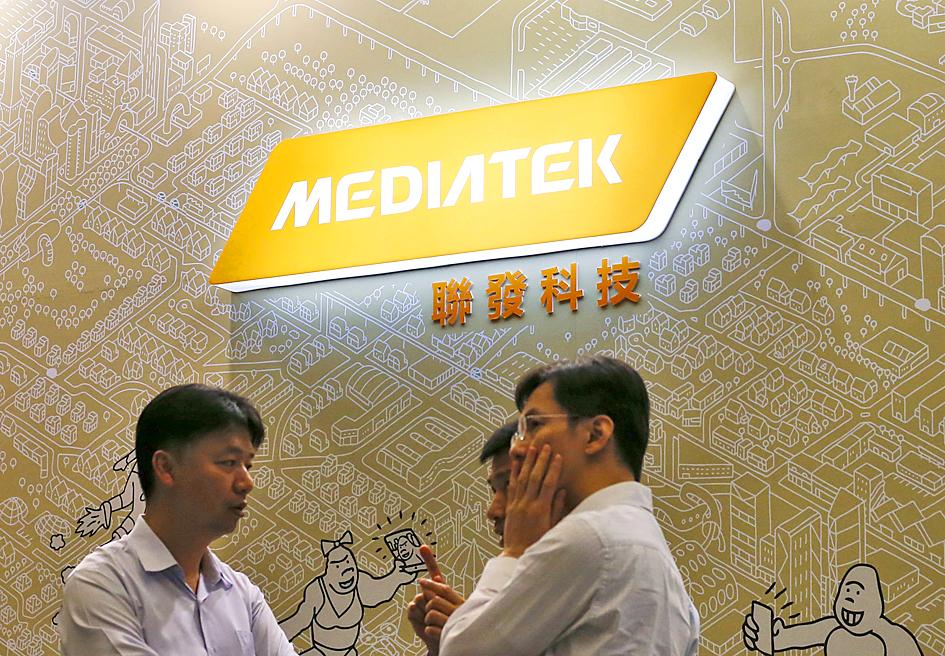MediaTek Inc (聯發科), the world’s biggest designer of 5G handset chips, is stepping up its recruitment drive this year, with plans to hire more than 2,000 engineers specializing in core technologies, including 5G, wireless communication and artificial intelligence (AI).
That would be double from the more than 1,000 people it hired on average in the past few years, as the Hsinchu-based company looks to boost growth this year and beyond.
It also comes as the company plans to launch a new 5G chip, Dimensity 2000 series, which supports mmWave technology and sub-6-gigahertz technology, at the end of this year. That would be the first mmWave chip from MediaTek.

Photo: Ritchie B. Tongo, EPA
The chip designer plans to offer an annual compensation of NT$1.5 million (US$53,658) for engineers with a master’s degree and more than NT$2 million for those with a doctoral degree, it said in a statement.
Those are higher than the compensation offered by local semiconductor companies, including Taiwan Semiconductor Manufacturing Co (台積電).
Mediatek said it plans to spend at least NT$100 billion on research and development this year, which is about 30 percent higher than the NT$77.3 billion it spent last year.
The company also plans to give incentive bonuses to employees. Last year, it distributed an incentive bonus of NT$100,000 each to 17,000 employees after it posted a record-high revenue of NT$322.1 billion, up 30.8 percent from the previous year. It expects a 40 percent increase in revenue this year.
MediaTek has proposed issuing 19.08 million new common shares in the form of restricted stock for employees who have made significant contributions to the firm, or with core technology capabilities that are crucial to the company’s development.
The proposed share issue is subject to shareholders’ approval at the company’s annual general meeting on June 10.
Shareholders are also to elect new board directors. MediaTek president Joe Chen (陳冠州) is on the short list of directors, while vice chairman Hsieh Ching-jiang (謝清江) and incumbent board director Wayne Liang (梁公偉) are to leave the board, the company said.

SEEKING CLARITY: Washington should not adopt measures that create uncertainties for ‘existing semiconductor investments,’ TSMC said referring to its US$165 billion in the US Taiwan Semiconductor Manufacturing Co (TSMC, 台積電) told the US that any future tariffs on Taiwanese semiconductors could reduce demand for chips and derail its pledge to increase its investment in Arizona. “New import restrictions could jeopardize current US leadership in the competitive technology industry and create uncertainties for many committed semiconductor capital projects in the US, including TSMC Arizona’s significant investment plan in Phoenix,” the chipmaker wrote in a letter to the US Department of Commerce. TSMC issued the warning in response to a solicitation for comments by the department on a possible tariff on semiconductor imports by US President Donald Trump’s

‘FAILED EXPORT CONTROLS’: Jensen Huang said that Washington should maximize the speed of AI diffusion, because not doing so would give competitors an advantage Nvidia Corp cofounder and chief executive officer Jensen Huang (黃仁勳) yesterday criticized the US government’s restrictions on exports of artificial intelligence (AI) chips to China, saying that the policy was a failure and would only spur China to accelerate AI development. The export controls gave China the spirit, motivation and government support to accelerate AI development, Huang told reporters at the Computex trade show in Taipei. The competition in China is already intense, given its strong software capabilities, extensive technology ecosystems and work efficiency, he said. “All in all, the export controls were a failure. The facts would suggest it,” he said. “The US

The government has launched a three-pronged strategy to attract local and international talent, aiming to position Taiwan as a new global hub following Nvidia Corp’s announcement that it has chosen Taipei as the site of its Taiwan headquarters. Nvidia cofounder and CEO Jensen Huang (黃仁勳) on Monday last week announced during his keynote speech at the Computex trade show in Taipei that the Nvidia Constellation, the company’s planned Taiwan headquarters, would be located in the Beitou-Shilin Technology Park (北投士林科技園區) in Taipei. Huang’s decision to establish a base in Taiwan is “primarily due to Taiwan’s talent pool and its strength in the semiconductor

French President Emmanuel Macron has expressed gratitude to Hon Hai Precision Industry Co (鴻海精密) for its plan to invest approximately 250 million euros (US$278 million) in a joint venture in France focused on the semiconductor and space industries. On his official X account on Tuesday, Macron thanked Hon Hai, also known globally as Foxconn Technology Group (富士康科技集團), for its investment projects announced at Choose France, a flagship economic summit held on Monday to attract foreign investment. In the post, Macron included a GIF displaying the national flag of the Republic of China (Taiwan), as he did for other foreign investors, including China-based